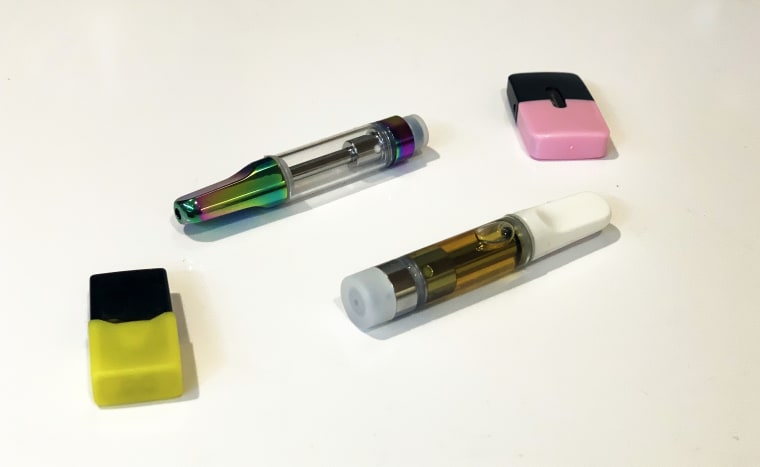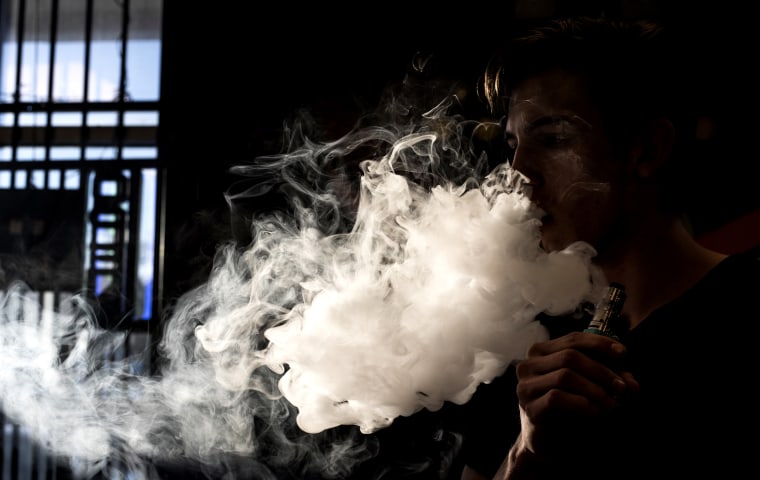An eighth person has died from a vaping-related lung illness. The Missouri Department of Health and Senior Services reported Thursday afternoon that a man in his mid-40s died this week in St. Louis. Health officials said the man had normal lung function before he started vaping in the spring.
He developed a mild respiratory illness which ultimately progressed, leading to hospitalization and death.
“This is an unfortunate case of a young man with no prior lung illness who started vaping because of chronic pain issues," Dr. Michael Plisco, a pulmonologist at Mercy Hospital St. Louis, wrote in a statement.
"Once the lungs are injured by vaping, we don’t know how quickly it worsens and if it depends on other risk factors," he continued.
Seven other patients have died from the illnesses: two in California, and one each in Indiana, Illinois, Kansas, Minnesota and Oregon. Several of the victims also had underlying health conditions.
Earlier Thursday, the Centers for Disease Control and Prevention predicted the death toll would rise.
"We do expect others," Schuchat said during a call with reporters.
The grim prediction came as federal investigators launched a criminal investigation into the soaring number of illnesses nationwide, which has risen by 200 cases in recent days.
The Food and Drug Administration's law enforcement arm, the Office of Criminal Investigations, began looking into these cases shortly after the illnesses began popping up.
"The focus of their work is to identify what is making people sick, as well as a focus on the supply chain," Mitch Zeller, director of the FDA's Center for Tobacco Products, said on the call.
Zeller emphasized the FDA is not pursuing any charges against people who admit to vaping or otherwise using illicit drugs.
"We are in desperate need of facts and answers to questions," said Zeller.
The CDC updated their case numbers Thursday, reporting that there were 530 cases in 38 states, plus the U.S. Virgin Islands.
"We're seeing severe cases," Schuchat told NBC News. She said patients often go to the hospital with shortness of breath related to a lung illness that appears to be a type of pneumonia.
"But instead of an infection, they appear to have a chemical injury," Schuchat said.
The CDC is only counting cases that have been confirmed or are classified as highly probable because doctors have been able to rule out all other causes of the lung illness.
The new CDC case count may in fact be an underestimate of the actual number of vaping-related pulmonary injuries. Doctors in nearly every state are examining far more cases. Overall, 45 state health departments have reported investigations of more than 700 possible cases.
Many of those patients report having vaped a variety of products, often including THC, the active ingredient in marijuana, before getting sick. Patients have experienced coughing, fever, trouble breathing, chest pain, vomiting, diarrhea and general fatigue. Some have needed to be hospitalized in intensive care units and placed on ventilators.
We are in desperate need of facts and answers to questions.
The CDC also provided a closer look at who is getting sick. A majority — 67 percent — are people between 18 and 34, with more than half under age 25.
Sixteen percent are minors under 18, and 17 percent are over 35. Nearly three-quarters are men.
In addition to the criminal probe, the FDA has tested 150 product samples for a broad range of chemicals, including painkillers, additives, pesticides, poisons and toxins.
No single ingredient or product has linked all of the cases.
The investigation is hampered in part by the lack of information coming from the patients themselves.
"Some individuals are unable to talk with public health professionals because of the severity of their illness," said Dr. Jennifer Layden, chief medical officer and state epidemiologist for the Illinois Department of Public Health.
"Or there is hesitancy about sharing information about the products they've used, especially if they are illicit products," she said. Illinois has reported 69 cases of vaping-related pulmonary illnesses.
Health officials searching for clues behind the mysterious illnesses are urging the public to come forward with information, letting them do so anonymously and without fear of prosecution if they've been using illicit substances.
Layden said investigators in Illinois are using social media to learn more about vaping habits, and have set up an anonymous online survey for residents who use e-cigarettes or other vape devices.
"The hope is that individuals will want to help advance this investigation," said Layden.
On Wednesday, new research from the University of Michigan showed a significant increase in the number of kids vaping nicotine products.
The survey found that, from 2017 to 2019, rates of vaping more than doubled among eighth graders, 10th graders and high school seniors.
More than 25 percent of 12th graders and more than 20 percent of high school sophomores said they'd vaped within the past month. And one in 11 kids in the eighth grade also admitted to vaping.

The surge in popularity of vaping among teens has prompted addiction and substance abuse experts to take a closer look at how to help young people break their addiction to nicotine, as well as how to handle kids when they're caught vaping in school.
A school district in western Ohio recently changed its policy for students caught with an e-cigarette or other tobacco product on school grounds. Instead of detention and a juvenile court charge, kids who are caught vaping don't get in trouble — they get educated.
"They're our students, so we want to offer support and help them by providing a cessation class," Paula Crew, superintendent of Tecumseh Local Schools, told NBC News.
First-time offenders in Crew's school district are required to attend a two-hour course to help them stop using e-cigarettes and similar products. Crew said three students were caught just this week.
"If you tell a child not to do something, that is not an effective way to get them to quit," said Crew. "You have to give them strategies and support and evidence to show them why they shouldn't do it."
Public health strategies to curb teen vaping increasingly involve bans on the very flavors that experts say attract kids.
The Trump administration announced plans to ban flavored e-cigarettes a week ago, but it's unclear how or when that ban would take effect.
Health officials in San Francisco, Michigan and New York have already enacted such bans.
Follow NBC HEALTH on Twitter & Facebook.



